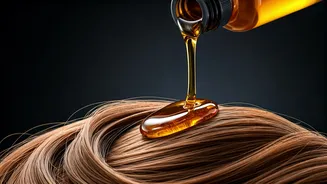Understanding Hair Damage
Dry and damaged hair results from various factors, including environmental exposure, chemical treatments, and heat styling. Exposure to the sun's harsh
rays, constant use of blow dryers, and frequent perming or straightening can strip the hair of its natural oils, leading to dryness, breakage, and split ends. Identifying the cause of hair damage is the first step toward finding a suitable treatment. For many, the use of harsh shampoos and styling products further exacerbates the problem, leading to a vicious cycle of damage and repair. Understanding these factors is key to choosing the right hair oil and formulating a successful hair care routine. The selected oils cater to these specific needs.
Argan Oil's Magic
Argan oil, derived from the argan tree kernels of Morocco, is a popular choice for treating dry and damaged hair due to its rich composition of fatty acids and antioxidants. It's often praised for its ability to moisturize the hair, reduce frizz, and add shine, making it an ideal choice for those with dry or brittle hair. The oil is quickly absorbed into the hair shaft, providing deep hydration without leaving a greasy residue. Argan oil can help repair damaged hair by sealing split ends and protecting the hair from environmental stressors such as pollution and UV rays. It is used in many hair care products because of its effectiveness. Regular application can help restore the hair's natural elasticity and improve its overall health, leading to softer, more manageable hair.
Coconut Oil's Power
Coconut oil, a staple in many Indian households, is highly beneficial for hair health. It is particularly effective for dry and damaged hair because of its ability to penetrate the hair shaft, providing deep hydration from the inside out. Unlike many other oils, coconut oil can reduce protein loss from hair, which is crucial for maintaining its strength and preventing breakage. Its high content of lauric acid enables it to easily penetrate the hair, making it an excellent choice for those seeking to repair damaged hair. Applying coconut oil regularly can improve the hair's overall texture, reducing dryness and enhancing shine. It also helps to condition the scalp, contributing to the growth of healthier hair. It has gained popularity for its multiple benefits and is easy to find.
Jojoba Oil's Benefits
Jojoba oil is a unique oil that closely resembles the natural sebum produced by the human scalp, making it an excellent choice for hair care. Its similarity to sebum allows it to balance oil production, making it suitable for all hair types, including dry and damaged hair. Jojoba oil moisturizes the hair and helps to strengthen it, reducing breakage and split ends. Because it's a lightweight oil, it doesn't weigh the hair down, making it perfect for those with fine or thinning hair. It's also rich in vitamins and minerals that nourish the scalp, promoting healthier hair growth. Regular use of jojoba oil can improve hair manageability, adding shine, and protecting it from environmental damage, contributing to a healthy, vibrant appearance.
Olive Oil's Richness
Olive oil, a traditional remedy for hair care, is renowned for its moisturizing and conditioning properties. Packed with antioxidants and essential fatty acids, it deeply nourishes the hair, repairing damage caused by dryness. It penetrates the hair shaft, restoring moisture and elasticity, making it especially effective for treating brittle and dry hair. Olive oil acts as a natural conditioner, leaving hair soft and manageable. It also helps reduce frizz and split ends, giving the hair a healthier look and feel. Regular application of olive oil can improve the overall condition of the hair, making it a valuable addition to any hair care routine. The antioxidants in olive oil help protect the hair from damage. The result is stronger, shinier, and more resilient hair.
Almond Oil's Soothing Touch
Almond oil, rich in vitamins E and fatty acids, offers a gentle yet effective solution for dry and damaged hair. It acts as a natural emollient, softening the hair and increasing its moisture retention, which makes it an excellent choice for alleviating dryness. Its lightweight texture allows it to penetrate the hair easily, providing deep hydration without weighing it down. Regular use of almond oil can improve hair strength, reduce breakage, and promote shine. Almond oil is also known to soothe the scalp, reducing irritation and promoting healthier hair growth. It can improve the overall health and appearance of the hair. Its ability to penetrate the hair shaft makes it an exceptional choice for restoring vitality to dry, damaged hair.
Castor Oil for Growth
Castor oil is a thick, viscous oil traditionally used for hair growth and strengthening. Its high ricinoleic acid content provides intense moisturizing and conditioning benefits, making it an effective treatment for dry and damaged hair. Castor oil can help seal in moisture, reducing dryness and preventing breakage. It promotes hair growth by stimulating the scalp and increasing blood circulation, which provides essential nutrients to the hair follicles. Many users notice a significant improvement in hair thickness and strength with regular use of castor oil. It is often mixed with lighter oils, such as coconut or almond oil, to make application easier. Castor oil's ability to boost hair growth and reduce damage makes it a valuable addition to hair care.
Avocado Oil's Richness
Avocado oil, rich in vitamins, minerals, and fatty acids, is a powerhouse for hair health, particularly effective for dry and damaged hair. Its high content of oleic acid deeply penetrates the hair shaft, providing intense hydration and nourishment. Avocado oil helps to repair damage caused by heat, chemicals, and environmental factors. It helps to strengthen the hair, reduce breakage, and restore shine. The nutrients in avocado oil help to protect the hair from future damage and improve its overall health. Applying avocado oil regularly can significantly improve the texture of dry and damaged hair. Its ability to deeply hydrate and fortify the hair makes it an excellent choice for anyone seeking to revitalize their locks.
Rosemary Oil's Boost
Rosemary oil is frequently utilized in hair care for its ability to stimulate hair growth and enhance the overall health of the scalp. Its invigorating properties improve blood circulation in the scalp, promoting better nutrient delivery to the hair follicles, which is essential for strong and healthy hair. Rosemary oil's antioxidant and anti-inflammatory properties can help protect the hair from damage and reduce scalp irritation. It has properties that can help prevent premature greying and hair loss. It can make hair look thicker. When used regularly, rosemary oil can significantly improve the condition of dry and damaged hair, promoting growth and vitality. Rosemary oil's benefits extend beyond cosmetic improvements, making it a valuable addition to a comprehensive hair care routine.
Choosing & Using Oils
Selecting the right hair oil is critical to achieving the best results for dry and damaged hair. Consider factors such as hair type, the degree of damage, and the desired outcome. For example, thicker oils like castor oil are great for intensive treatment, while lighter oils like jojoba are perfect for daily use. When applying hair oils, start with a small amount and gently massage it into the scalp, ensuring even distribution throughout the hair. Leaving the oil on for at least 30 minutes, or even overnight, allows for deep conditioning. Rinse thoroughly with a mild shampoo and lukewarm water. Consistency is key; incorporating these oils into your routine regularly will help repair and strengthen dry and damaged hair. Experimenting with different oils and combinations can help you find the most effective solution for your unique hair needs.



















